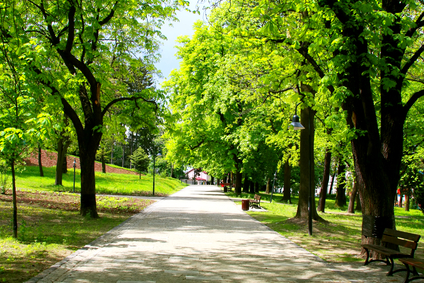Depression can be helped by a walk in the park
By Liz Lockhart
A walk in the park may give cognitive benefits to people with major depression, according to new  research.
research.
A study by Baycrest’s Rotman Research Institute in Toronto and the University of Michigan and Stanford University is one of the first to examine the effects of nature walks on cognition and mood for people who have major depression.
The research team was led by Marc Berman of Rotman Research Institute and is published on line in the Journal of Affective Disorders.
Dr Berman says ‘Our study showed that participants with clinical depression demonstrated improved memory performance after a walk in nature, compared to a walk in a busy urban environment. He warned that such walks are not a replacement for existing treatment such as psychotherapy and drug treatment.
He added ‘Walking in nature may act to supplement or enhance existing treatments for clinical depression, but more research is needed to understand how effective nature walks can be to help improve psychological functioning.’
This research is part of a larger cognitive study called Attention Restoration Theory (ART). ART proposes that people have increased concentration after having spent time surrounded by nature or after looking at nature scenes. ART suggests that when people interact with peaceful natural surroundings they are not bombarded with external distractions which can be burdensome to the working memory. When surrounded by nature the brain can take time to relax and become contemplative which helps to refresh cognition.
Prior research work conducted by Dr Berman includes a study in 2008 which showed that adults who had no diagnosis of ill health received a mental boost from a one hour walk in a woodland park. This improved their memory and attention performance by 20% when compared to a one hour stroll in a noisy urban area. This current study explores whether a nature walk would have similar benefits for people with clinical depression.
The research team was sceptical of similar findings at first, due to the fact that depressed people have high levels of negative thinking and rumination. They were uncertain that just one solitary walk in the park would provide any benefit and felt that it could result in worsening memory and making their mood worse.
The study recruited 20 participants, all of whom had a diagnosis of clinical depression. A two-part experiment was used for the 12 female and eight male participants whose average age was 26. In the first part the participants took a walk in a quiet nature setting and in the second part they strolled through a noisy urban area.
Before they took their walks, the participants completed baseline testing to see the status of their cognition and mood. They were asked, before their walks, to contemplate an unresolved, painful autobiographical experience. They were randomly assigned to walk for an hour either in a woodland park or in a traffic heavy area. They took a prescribed route and wore GPS watches to ensure that they stuck to their route.
After completing their walks, the participants were assigned a series of mental tests to assess their attention and short-term working memory. They were also re-assessed for mood. A week later the participants repeated the entire process but swapped the areas in which they had previously walked.
It was found that after the nature walks, the participants showed a 16% increase in attention and working memory, compared to the urban walks. Both walks were found to decrease negative mood and increase positive mood.
This suggests that taking a walk of any kind can lift the mood but added benefits can be found by walking in a tranquil nature setting.





